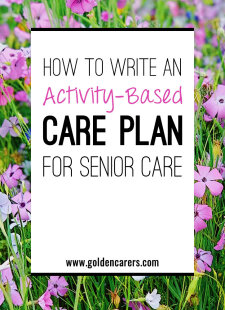20 Practical Activities for people living with Alzheimer’s Disease

Developing practical, efficient and meaningful leisure programs for people with Alzheimer's Disease requires creative thinking.
What is Alzheimer's Disease?
Alzheimer's Disease is a chronic and progressive condition characterized by the decline of cognitive functions such as reasoning, remembering and planning. It affects people in different ways; no two individuals will experience exactly the same progression of the disease. A person's personality, health and social situation are all important factors that influence the impact of dementia.
Related: What is dementia? Alzheimer's Disease vs Dementia
Finding activities for the elderly with Alzheimer's
Structured group activities very seldom work. Simple, brief activities offered several times a day are the most effective and beneficial types of activities for Alzheimer's.
Activities such as housework and simple games can help to maintain motor skills. Listening to music is also a very calming and engaging activity.
The focus should be on the person and not the condition. Try to match people with activities that suit their background and experience.
What sorts of activities are most effective?
The following ideas may be used on a one-to-one basis and others may be suitable for small groups depending on their abilities. Some of the activities suggested are Montessori based, developed to promote and maintain existing skills.
Some activities such as sorting, pairing, matching and puzzles should be offered once and then repeated twice during the week. Despite having poor recollection, people living with Alzheimer's can still learn through practice and repetition.
Most activities that require movement: grasping, pressing, pushing, gripping, extending, scooping and reaching are helpful in improving hand-eye coordination. These types of activities also provide sensory stimulation and promote well-being.
If utensils or tools are to be used, make sure they are adapted to the needs of individuals. Supervision at all times is essential.

20 Activities for people living with Alzheimer's Disease
1. Fiddle Box
Check your resident's profile and collect items according to his/her previous profession or occupation. Place items in a box and present it to the resident two or three times a day for a 'feel, touch & explore'.
Related: Fiddle boxes & other ideas to stimulate the senses
2. Deck of cards
Give your resident a deck of cards to be separated into suits: spades, hearts, diamond and clubs. All other cards should be removed from pack.
3. Music
Play folk or popular music from your resident's era – this never fails to please. Give residents percussion instruments to add to the fun.
Related: Free Music Playlists for the Elderly
4. Rubber Tipped Darts Game
This can be played by one or two people, each having three darts to throw. It does not injure players or damage walls.
5. Untying Knots
Buy a medium rope and tie a few simple knots. Ask resident to 'help' you untie the knots.
6. Threading Yarn or String
Buy large pasta loops for residents to string together with a thick yarn or thin rope.7. Doll Therapy
Despite this being somewhat controversial, in my experience doll therapy works well and I would recommend recreation staff try it. The dolls should be dementia specific (and look like newborn babies). Buy a bassinet, a baby bath, a cot and lots of baby clothes. Female residents love to change clothes, wash, and put baby down for a nap.
Related: Doll Therapy and Dementia
8. Display of Insects
A display of worms or ants in a large glass container (placed in a secure place) is a good subject for conversation.
9. Fabric box
Provide a large cardboard box with dozens of pieces of assorted fabric inside it; silk, lace, felt, velvet, acrylic and wool. Sit 3 or 4 residents around a table and place fabric box in reach of all. Touch, feel and fold.
10. Beach ball
Buy a large beach ball and let sitting residents roll or kick it to each other from their chairs.
11. Fish tank
This provides visual stimulation and is a good topic for conversation.
Related: Snoezelen Rooms & Sensory Environments
12. Matching shapes
Matching shapes or pictures is a fun game combining sensory stimulation and thinking skills.
Related: Matching Shapes Activity
13. Pairing & Sorting
Similar to the above; residents will match pictures, shapes and other objects together.
Related: Pairing & Sorting Activity
14. Pom-Poms
Give residents colored pom-poms and provide containers of the same color. Residents will place pom-poms in the matching colored container.
Related: How to Make Pom-Poms
15. Golf Balls
Another inexpensive 'sorting by color' activity. Buy second hand golf balls and paint or spray in different colours. Give resident an ice-cream scoop to scoop the golf balls into containers of the same colour.
16. Picture Puzzle
Enlarge a photo of the resident or one of his close relatives. Laminate it and cut into four odd pieces for resident to put together. Alternatively: a colorful picture of a car, fruit or landscape also works well.
Related: Picture Puzzle Activity
17. Activities relating to the individual’s former life.
For instance, a carpenter may enjoy sanding a nice piece of wood, a post office worker may enjoy stamping envelopes, a home-maker may enjoy arranging pots and pans on a shelf etc.
Related: Daily Living Activities
18. Reminiscing
Long term memory can be retained by people living with dementia even as the illness progresses. Here are some suitable reminiscing activities:Related:
19. Cutting pictures out of old calendars
Use safety scissors to cut pictures from calendars; collect enough pictures to make a poster to maintain dexterity and provide a sense of accomplishment.
20. Cup cake decorations
Buy a few dozen cup cakes. Make icing in two colours and put into piping bag. Assist residents to ice one or two cupcakes until they feel confident to do it on their own. Alternatively a plastic spatula will keep them busy and entertained for a while.
Related: 15 Activities for Late-Stage Alzheimer's Disease
We'd love to hear your feedback on activities for the elderly with Alzheimer's.
What has worked for you?






For Julieanne Here is a link to fiddle aprons, fiddle tablecloths etc. If you can sew you can make these cheaply. http://www.sensationsdcp.com.au/sense-apronsreg.html
in the unit we have 4 men very physically able we have started a mens shed with tins of screws , nuts , washers to sort , timber to sand and with a male volunteer there are a few happy hours wittled away chatting , laughing and sometimes deep conversations about the past i suggest if you have this situation discuss it with your manager it creates sometjing for men away from the female folk it gives validation, socalisation and boosts self esteem and self confidence reducing discontentment , depression and feelings of inadequecy.
I hqve been told about a wall hanger that has zips,materials lace and other things that have been sewn on material that hangs on the wall , I was wondering if you could help me with this as my father has dementia and I thought this would help him as well as the other people where he lives , I would like to make this if I had some sort of picture of it or an idea how to make it Regards julieann
FLOWER DECORATING Di Rudd.
Cover a large table with table cloths. I use fitted sheets to cover my tables for activities. Put on the table a large assortment of artificial flowers, vases, twine etc. The visual sensory attracts everyone, including the men.
some will place flowers in vases, others will touch and reminisse. ive had the men twining bunches of flowers together for the ladies. be prepared for your residents to take tese to there rooms.. Keep any damaged flowers that have no stems as these are great for decorating hats for Melbourne Cup. We also make our own Anzac flowers during Flower Decorating. The reason I use a fitted sheet is to prevent it being pulled off and I can shake the excess into the bin after the activity
thanks for the ideas i will try them out in a special care unit
Thanks for the 16 dementia activities. I am a newbie as a Lifestyle assistant and am finding dementia activities tricky. Thanks for your great insight. Lynne Wright
51 to 56 results of 56